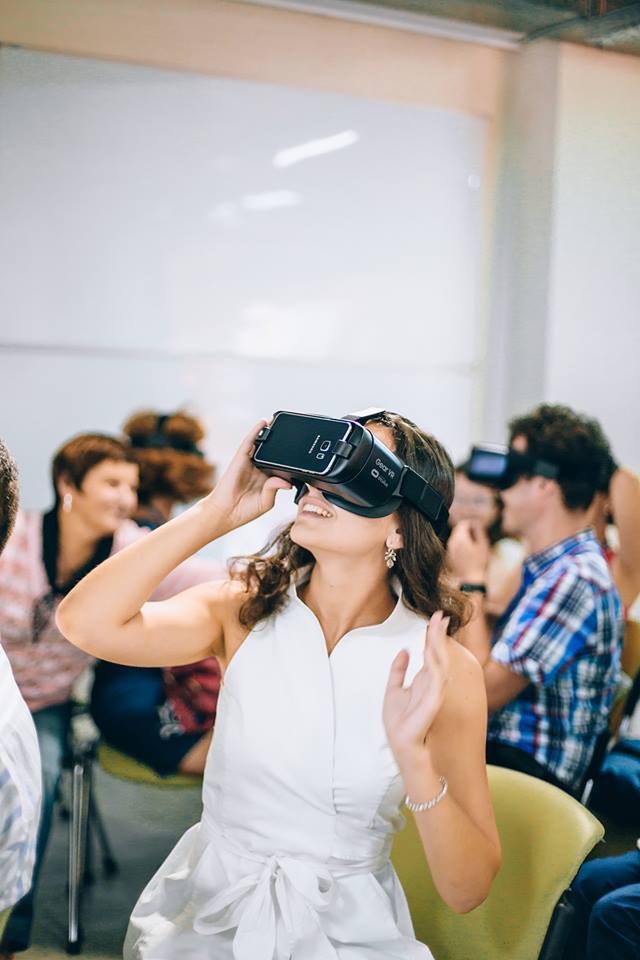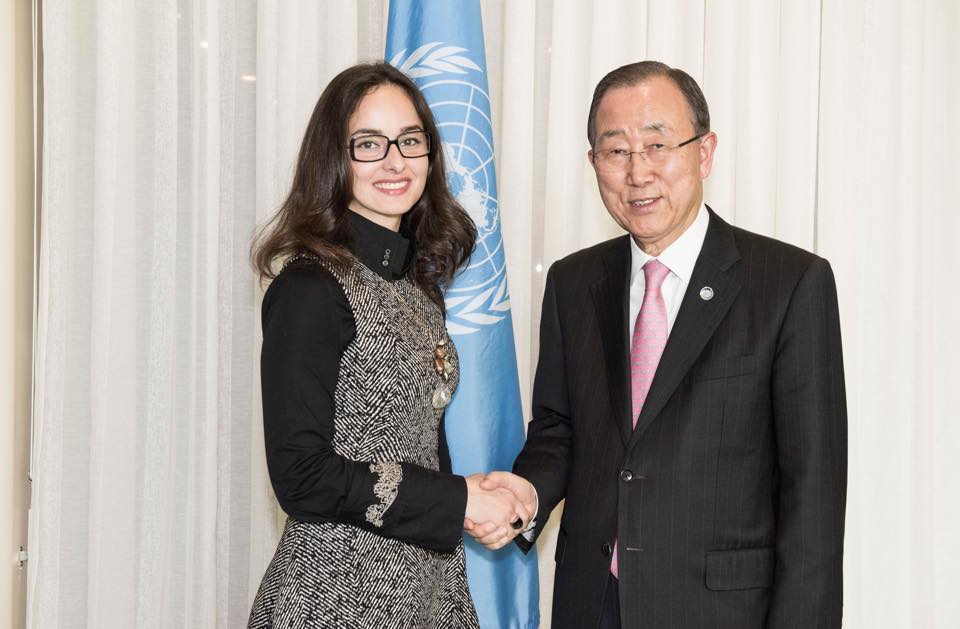THE LEADERS OF TOMORROW
ATHENA & TELEMACHUS ALUMNI
Q: Tell us a few things about your country, and also your life's story!
Ukraine is a country of great people, incredible opportunities, and numerous challenges. I believe that all the thunderstorms which have occurred recently made us stronger as a nation. Even though a national identity is a question of the 20th century, Ukraine became independent only 27 years ago, in 1991. For 70 years, the Soviet Union did a great job in creating a Soviet identity through various channels of communication, but no one has put the same efforts into revealing Ukrainian identity since the independence. As a result, Ukrainians have had an incredibly compressed course in identifying themselves. Carl Schmitt, the German political theorist, in his famous work, “The Concept of the Political”, defended the view that all true politics is based on the distinction between friend and enemy. It seems like we are at the stage of unifying through the opposition towards those who decided to invade Ukraine culturally and territorially. A Mexican proverb says that “they tried to bury us, but they didn’t know we were seeds”. I can definitely say that all the political, territorial and even military obstacles united Ukrainians and made us work harder towards a brighter future. Regardless of the fact that in 2014, Ukraine de facto lost control of an area of almost 45 000 square kilometres, which housed 6 million people; currently Ukraine has $ 17 billion in agricultural exports, 32 airports, 170 000 km of roads, 2000 new start-ups, an IT sector worth $5 billion, 18% annual growth of investments in pharmacy and is the number one sunflower exporter in the world.
For the last 7 years, I have been living in Kyiv, although originally I am from Dnipro, Ukraine. I studied at the Ukrainian-American Lyceum and hold a BA with Honours in Philosophy and Religious Studies, and a MA in Political Science from Taras Shevchenko National University of Kyiv. In 2016, I was selected as a Ukrainian Youth Delegate to the United Nations, while currently I am working at the Sensorama Academy as a Chief Education Officer. We provide courses for VR/AR developers and bring VR/AR technologies into schools. This February I was admitted to the University of Cambridge and hope to start an MPhil Public Policy Program this October.
Q: What is your view of the world as it is today? And how do you define the concept of a better world?
We live in a fantastic and unpredictable era, the era of technology and new challenges. The world is global and vibrant. I support the concept of the global village which was formed by Marshall McLuhan in his book “The Gutenberg Galaxy: The Making of Typographic Man”. He described how the globe had been contracted into a village by electric technology and the instantaneous movement of information from every quarter to every point at the same time. What does this tell us? We should finally realize that we are interconnected and that a village is not only a place where everyone knows each other but rather where everyone somehow depends on each other. The documentary film “Before the Flood” directed by Fisher Stevens and produced by Leonardo DiCaprio, as a United Nations peacemaker, clearly shows that the actions of people on one part of the world affects the climate, lives, and well-being of people on the opposite part of the world.
I consider that global awareness and responsibility should serve as the background of a better world. After time spent at the United Nations General Assembly, I can draw my personal conclusion that among the 193 countries, there are those who live in the 21st century and those who are still in 20th or even 19th century. The most crucial thing is to find a way to form a common understanding of a better world. I believe that only through cooperation, open borders, and the willingness to understand other viewpoints and take responsibility, can we build our shared, better future.
Q: What are some of the key challenges in your society?
I consider that the biggest challenge in Ukrainian society is a post-soviet mindset. The attitude where you wait for something from someone instead of doing. Although some people are still waiting for the government to cure them, the younger generation is establishing dozens of initiatives in public and private sectors. It is not an easy task to change someone's mindset and it takes time. I believe that younger generation’s awareness of personal responsibility will soon become the norm, and we will see the results in our society.
Another challenge is corruption in the higher levels of the political establishment. I believe that the second problem arises from the first one. I consider that politicians’ mindset of zero responsibility to the voters and people makes them think more about their personal well-being instead of the common public good. I hope that a new generation of well-educated young leaders with core values such as professionalism, ethics, accountability, and objectivity will soon bring another perspective into the public service.
Q: As a young individual what are a few of the hurdles that you had to overcome up until today?
For the last four years, my family has been divided because of the conflict in the East of the country. As a child who was raised in the eastern part of Ukraine, I strongly believe that bridges of understanding should be built between the two parts of the country. Even though I cannot visit my grandmother in the occupied territory, I can create more understanding among youth and keep them from separatism. Thus, for the last two years together with a team of like-minded people, we have organized two volunteer tours for 100 young leaders which is called ‘Here and Now'. A number of essential needs were addressed, such as healing divisions that the war has created. This was done by engaging Ukrainian youth in cultural exchange, teaching youth leadership and principles of active citizenship. Also, we conducted socio-ecological projects jointly organized by the volunteers and community members to provide practical input and promote sustainable development in communities. Through these activities, we created an opportunity to experience true life in both parts of Ukraine and break the existing stereotypes. As young leaders from the East traveled to the Western regions and vice versa. The idea that everyone is Ukrainian no matter whether one lives in the East or in the West was created. From this, I believe that active actions help to overcome all the hurdles.
Q: Why is the role of a mentor important for you?
When you feel support from someone who is more experienced, who have reached professional and personal heights, you start to believe more in yourself.
Q: Do you have a lesson that life has taught you and you would like to share?
Always say the truth. There is a small novel
Q: Name a project, a foundation or a person in your country that you think is doing great work in helping improve other people's lives!
Olga Kudinenko, she is a founder of the Charitable Foundation "Tabletochki". The organization is involved in several areas: purchase of medicines that are not available in the country, payment of bone marrow transplantation operations from an unrelated donor that is not carried out in Ukraine, donor blood testing on the basis of Okhmatdet and popularization of the volunteer movement. For four years of existence "Tabletochki" collected more than 35 million hryvnia, helped more than 6,000 children and checked blood from 13,000 donors.
Q: What are some of the challenges that women in your country face and what efforts are made towards gender equality?
I would say that women in Ukraine have all opportunities to study and work, we have no limitations in our professional and personal development. Although there are still some cultural prejudices towards the age of giving birth and family priorities.
Since 2017 there is a project "Polina" under the Ministry of Internal Affairs with a cooperation with the National Police. The pilot mobile groups were established to counter domestic violence. I believe that gender equality starts from the safeness. I would like all women to feel safe in any place in the world.
Q: Athena40 is the first ever global selection of the top 40 women forward thinkers, commentators, activists, authors, academics, entrepreneurs, executives, innovators. Can you think of a truly innovative and forward-thinking woman from your country that you wish to nominate for the Athena40 global ranking?
I would nominate Katerina Kostereva. In 2002, she and his partner founded their own company Terrasoft, which in 15 years of existence has become the largest IT-business in the post-Soviet space. Now Terrasoft is about 6 thousand clients in Ukraine, Russia, and other post-Soviet countries, including Yandex, HH, Beeline, Heinz, Bayer, Alfa-Bank. The number of Terrasoft product users exceeds 300 thousand.
Q: Share with us a phrase, a poem or a story that you love or you find interesting!
You are your choices. Seneca
Q: Tell us one thing that you have learned from your mentor.
Do not be afraid to be the best.











